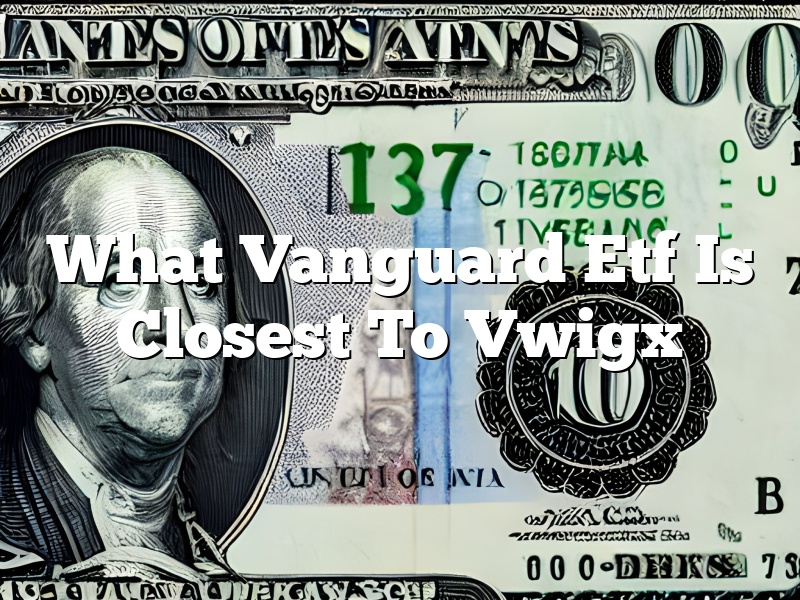What Vanguard Etf Is Closest To Vwigx
What Vanguard Etf Is Closest To Vwigx
There are many Vanguard ETFs to choose from, but which one is closest to VWIGX?
The Vanguard Wellesley Income Investor (VWINX) is the closest Vanguard ETF to VWIGX, with a 0.08% difference in expense ratios. VWINX is a balanced fund that invests in both stocks and bonds.
The Vanguard 500 Index Investor (VFINX) is also a good option, with a 0.09% difference in expense ratios. VFINX is a stock-only fund that tracks the S&P 500 index.
Both VWINX and VFINX are excellent choices for investors looking for low-cost, broadly diversified funds.
Contents
Is Vwigx a good fund?
If you’re looking for a solid investment fund, Vwigx may be a good option for you. This fund has a history of strong performance, and its managers have a proven track record of delivering results. Additionally, Vwigx offers a range of investment options that can accommodate a variety of risk tolerances and investment goals.
What is the ETF equivalent of Vtiax?
What is the ETF equivalent of Vtiax?
The Vanguard Total International Stock ETF (VXUS) is the ETF equivalent of Vtiax.
VXUS is a passively managed fund that seeks to track the performance of the FTSE Global All Cap ex US Index.
The fund has over 2,000 holdings in 46 countries, and is heavily weighted towards large-cap stocks.
VXUS is a good choice for investors looking for a diversified international stock portfolio, and who are willing to accept a slightly higher level of risk.
What is the ETF equivalent of Vemax?
The Vanguard MSCI Emerging Markets ETF (VWO) is one option to consider for investors seeking exposure to Vemax. VWO tracks the MSCI Emerging Markets Index, which is designed to measure the performance of publicly traded companies in emerging markets. As of July 2017, the fund had assets of more than $47 billion and an expense ratio of 0.14%.
Another option for investors seeking exposure to Vemax is the iShares Core MSCI Emerging Markets ETF (IEMG). IEMG follows the same index as VWO, and as of July 2017, it had assets of more than $19.5 billion and an expense ratio of 0.14%.
What is the ETF equivalent of Vbiax?
In finance, an exchange-traded fund (ETF) is an investment fund traded on stock exchanges, much like stocks. An ETF holds assets such as stocks, commodities, or bonds, and trades close to its net asset value over the course of the day. ETFs experience price changes as they trade, just like stocks, and can be bought and sold through a broker.
Which Vanguard International fund is best?
When it comes to choosing a Vanguard international fund, it can be difficult to decide which one is the best option. After all, there are many different types of Vanguard international funds to choose from, and each one has its own unique set of features and benefits.
If you’re looking for a Vanguard international fund that offers a high level of diversification, the Vanguard Total International Stock Index Fund might be a good option. This fund invests in stocks from both developed and emerging markets, making it a good choice for investors who want to spread their risk across a number of different countries.
Another Vanguard international fund that is worth considering is the Vanguard FTSE All-World ex-US Index Fund. This fund invests in stocks from more than 2,000 different companies located in more than 45 different countries. As a result, it offers a high level of diversification and can be a good choice for investors who want to exposure to a wide range of global markets.
Ultimately, the best Vanguard international fund for you will depend on your individual investment goals and preferences. However, these are two funds that are definitely worth considering if you’re looking for a quality international investment option.”
Is Vwigx actively managed?
Is Vwigx actively managed?
The answer to this question is yes, Vwigx is an actively managed fund. This means that the fund’s managers are constantly making decisions about what stocks to buy and sell in order to try and achieve the fund’s objectives.
This can be contrasted with a passively managed fund, which simply tracks an index, such as the S&P 500. With an actively managed fund, the managers are making all of the decisions about which stocks to buy and sell.
There are pros and cons to both active and passive management. Active management can lead to outperformance, as the fund’s managers can make decisions that beat the market. However, it also comes with more risk, as there is no guarantee that the fund’s managers will be able to beat the market.
Passive management, on the other hand, comes with less risk, but also less potential for outperformance. In general, passive funds will track an index very closely, meaning that they will not beat the market by very much.
So, which is better? This is a difficult question to answer, as it depends on individual circumstances. However, in general, active management is likely to be more beneficial for investors who are looking for potential outperformance, while passive management may be more appropriate for investors who are more interested in risk reduction.
Is VTI the same as Vtiax?
VTI and Vtiax are both exchange-traded funds (ETFs) that track the performance of the S&P 500 index. However, there are some key differences between the two funds.
VTI is a “passive” ETF that simply tracks the S&P 500 index. Vtiax, on the other hand, is a “smart beta” ETF that uses a “fundamental” investing strategy. This means that Vtiax tries to select stocks that are undervalued by the market and that have good long-term prospects.
As a result, Vtiax may be a better option for investors who are looking for a more active approach to investing. VTI may be a better choice for investors who are looking for a more passive investment.






0